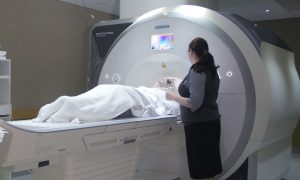Scanning centre to transform disease research and treatment
 The diagnosis and treatment of cancers, mental health disorders and conditions such as dementia is set to reach new heights in Brisbane with the launch of a $24 million facility that combines state-of-the-art equipment with world-class research and clinical expertise.
The diagnosis and treatment of cancers, mental health disorders and conditions such as dementia is set to reach new heights in Brisbane with the launch of a $24 million facility that combines state-of-the-art equipment with world-class research and clinical expertise.
The Herston Imaging Research Facility was officially launched by Premier Annastacia Palaszczuk today.
Facility Medical Director Dr Liz Kenny said the new centre was one of the most exciting clinical imagery ventures in the Asia Pacific.
“It will become the centre of clinical research in Queensland through the use of cutting-edge imaging equipment and will contribute to the understanding of diseases and the development of new drugs and treatment therapies,” she said.
Dr Kenny, who is also the Royal Brisbane and Women’s Hospital’s senior radiation oncologist, said the facility featured hybrid scanners which combined magnetic resonance imaging (MRI), positron emission tomography (PET) and computed tomography (CT), allowing molecular processes and anatomical images to be captured simultaneously.
“This results in a faster and more efficient process for researchers, clinicians and patients,” she said.
The facility is a collaboration between The University of Queensland, the Metro North Hospital and Health Service, QUT and the QIMR Berghofer Medical Research Institute, with Siemens as an industry supporter.
University of Queensland Vice-Chancellor and President Professor Peter Høj said the infrastructure made Queensland a better environment for the development of new patient treatments.
“It will add value to other recent partnership developments like the Queensland-Emory Drug Discovery Initiative and the Centre for Advanced Imaging, and give Queensland innovators a sharper edge in the global race for new preventions, treatments and cures,” he said.
Australian Cancer Research Foundation Chairman Mr Tom Dery said the facility would help Queensland’s world-class cancer scientists pursue important cancer research discoveries.
“The future of cancer prevention and treatments depends on Australia’s best researchers having access to the cutting-edge resources and technologies such as these,” he said.
QIMR Berghofer Medical Research Institute mental health and complex disorders leader Professor Michael Breakspear said the imaging facility would enable work to begin to categorise and discover different subtypes of mental health disorders.
“We’re exploring ways to diagnose mental health disorders before the symptoms appear,” he said.
“To do this we need to develop new diagnostic tests using medical imaging technology.”
QUT Faculty of Health Assistant Dean (Research) and Institute of Health and Biomedical Innovation Deputy Director Professor Greig De Zubicaray said the scanning capability of the new facility would contribute to understanding of the function and structure of diseases such as cancer and stroke.
“With this imaging technology we can detect disease, we can monitor progress and we can see whether or not we can predict recovery,” he said.
The Herston Imaging Research Facility is on the Herston health campus, near the Royal Brisbane and Women’s Hospital and major medical research facilities.
It has been funded by the Department of Science, lnformation Technology and lnnovation ($3 million), the Commonwealth Government ($3 million), the Australian Cancer Research Foundation ($2 million), the RBWH Private Practice Trust Fund ($1.5 million) and external funding bodies.
